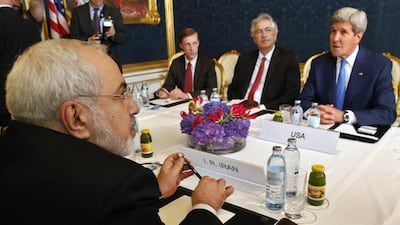There are only a few days left before the current negotiations on Iran’s nuclear programme between the P5+1 (the US, the UK, France, Germany, Russia and China) are due to be wound up. July 20 will signify the expiry of a six-month period allowed for a deal between the representatives of the countries involved. This is the anticipated conclusion of a diplomatic process aimed at a “comprehensive solution” to the Iranian nuclear programme that commenced in Geneva in November 2013. The process is intended to provide the initial framework for what would eventually be a detailed multi- lateral agreement.
The principle aim of the P5+1 is to ensure that Iran does not pursue building a nuclear weapon while permitting the country to develop a civil nuclear energy programme under close international supervision.
Iran is seeking sufficient uranium enrichment capacity to meet its future energy needs, a viable research and technology programme and the lifting of economic sanctions. Tehran is prepared to offer reassurance that its nuclear ambitions do not have a military dimension, although questions remain over the precise arrangements that would ensure strong monitoring mechanisms and information sharing.
So far, all parties in the negotiations have commended the sincerity of their partners’ efforts. Nevertheless, the public statements issued by the negotiating teams that renewed their talks in Vienna last weekend acknowledge that the going remains slow and that there are still many technical issues to resolve. The main sticking point is the number of uranium-producing centrifuges that the Iranians claim they need to run a viable civil energy programme.
Ayatollah Ali Hosseini Khamenei, Iran’s supreme leader, threw a rhetorical hand grenade into the discussion last week when he claimed that Iran would need at least 190,000 centrifuges, around 10 times the number that it currently operates. Ali Akbar Salehi, the head of Iran’s Atomic Energy Organisation, to some extent qualified Ayatollah Khamenei’s statement by telling the media that the figure of 190,000 actually referred to “Separate Work Units” (SWUs) rather than centrifuges. An SWU is a measurement of the amount of uranium produced by each centrifuge: while Iran’s first-generation centrifuge machines (IR1) yield less than 2 SWU, it is claimed that the latest model, the IR4, yields 24 SWUs, which would thus reduce the required number of centrifuges to fewer than 10,000.
Defining whether the amount of uranium needed by Iran should be measured in centrifuge machines or SWUs will at least give the negotiators in Vienna some scope to consider different solutions to the problem. But such technical difficulties cannot be entirely isolated from the political context of the talks.
The probable key to any agreement is the series of US-Iranian bilateral discussions that have been held on the fringes of the negotiations between the P5+1 and Iran. Despite a mutually constructive approach to the nuclear issue, the legacy of suspicion between Washington and Tehran remains strong. US negotiators suspect that the Iranians are still unwilling to make essential concessions, while foreign minister Mohammed Javad Zarif, the leader of the Iranian negotiating team, said at the beginning of the latest round of talks that Iran would not “kneel in submission” to other countries.
Although the P5+1 and Iran could yet agree to extend the talks beyond July 20, the stakes remain high for Tehran. A failure of the negotiations would have a significant effect on Iranian domestic politics. Iranian moderates will be criticised by hardliners in Tehran for trusting the US. With sanctions still in place and hopes of an economic recovery dashed, president Hassan Rouhani and his supporters will probably suffer the consequences in forthcoming elections in Iran. Indeed, Iran is likely to request some immediate sanctions relief in return to agreeing to an extension to the current round of talks. To maintain the pressure on Tehran, Washington will almost certainly resist such a concession.
Although US secretary of state John Kerry has resisted congressional calls for a tougher line towards Iran, the US negotiators in Vienna still have to factor in domestic political calculations.
The Iranian nuclear issue is one of many to ponder for President Barack Obama who, midway through his second term, will inevitably be considering his legacy when he leaves the White House. With the international community reduced to impotence in Syria, the rise of the Islamic State in northern Iraq and renewed fighting between Israel and Hamas, Mr Obama needs a foreign-policy success in the Middle East to confound his domestic critics.
With midterm elections due in November, some Republicans are reminding voters that the administration’s mistakes in the Middle East have served only to discourage friends and embolden extremists.
On balance, the US and Iran both have more to gain from making a deal than allowing the talks to fail. It is likely that the underdevelopment of Iran’s energy sector and an unemployment rate of 20 per cent will lead Ayatollah Khamenei to conclude that the political costs of rejecting international supervision of its nuclear programme would be unacceptable.
The Obama administration, anxious to present some good news from the Middle East, knows that it risks the unity of the P5+1 if the negotiations go on for much longer. If the US and Iran can overcome the obstacles, then Iran’s neighbours in the Arabian Gulf can hope that an international agreement on this issue can open a new era in terms of regional security.
Stephen Blackwell is an international politics and security analyst living in Abu Dhabi

